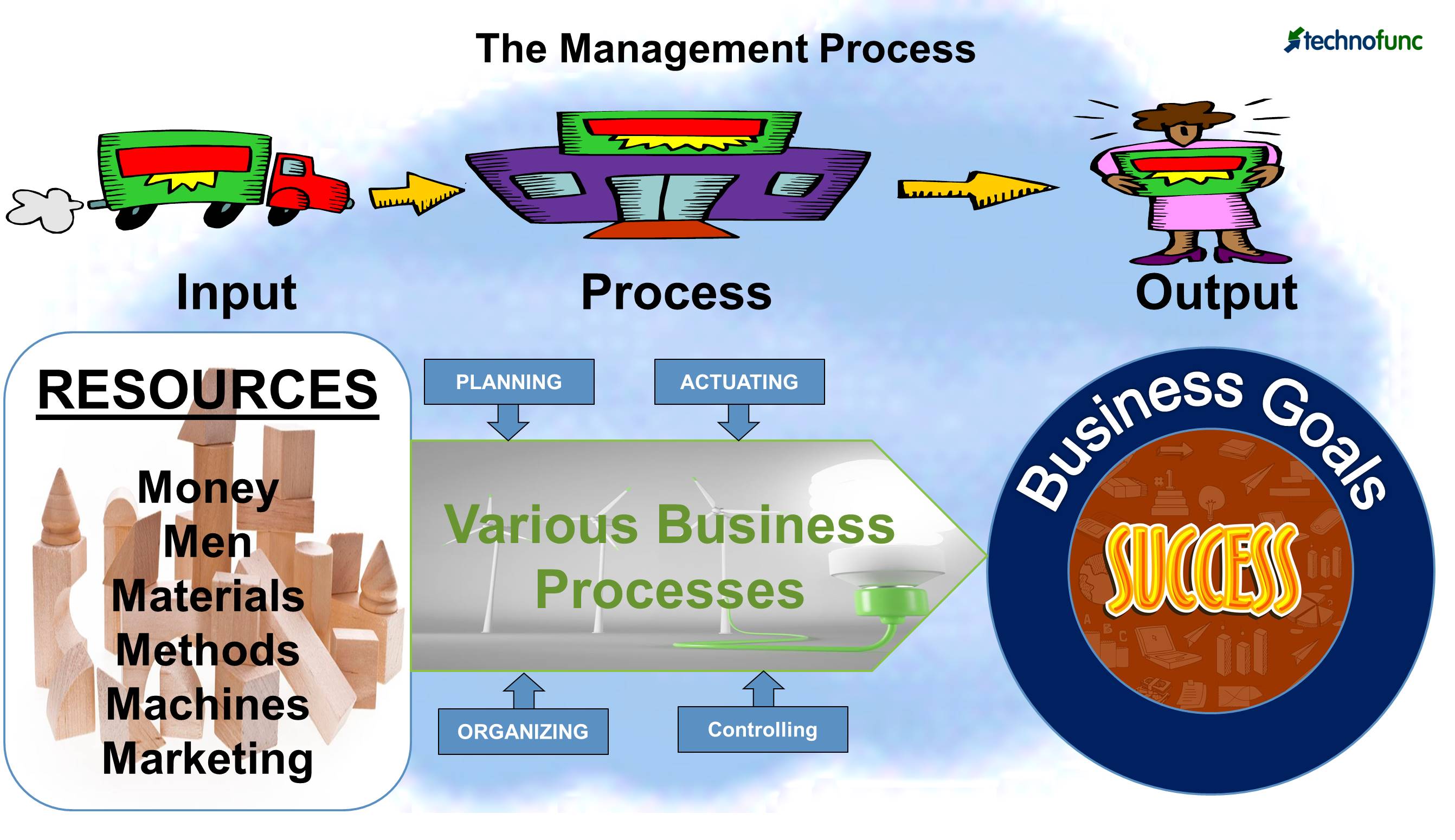- Home
- Business Processes
- Industry Knowledge
- Aerospace Industry
- Automotive Industry
- Banking Domain
- BFSI Industry
- Consumer/ FMCG Industry
- Chemicals Industry
- Engineering & Construction
- Energy Industry
- Education Domain
- Finance Domain
- Hospitality Domain
- Healthcare Industry
- Insurance Domain
- Retail Industry
- Travel and Tourism Domain
- Telecom Industry
- Leadership Skills
- eLearning
- Home
- Leadership Skills
- Leadership & Management
- Concept of Management
Concept of Management
The concept of management refers to the process of planning, organizing, staffing, directing, coordinating, and controlling to achieve organizational goals. It is the management of human, physical, financial, and other valuable resources of the organization in an effective and efficient manner to achieve business objectives.
Different people have conceived and defined management in different ways. But, the essence of management lies in determining worthwhile goals and then carefully selecting and utilizing resources through efficient and effective planning, organizing, actuating, and controlling to achieve those goals.
Who is a Manager?
You are a manager. What does this mean? The word derives from the ancient French word for handling horses and a later one for handling the affairs of the kitchen. Cynics might replace horses with donkey, but all would see the analogy of keeping an organization alive through the activities of the kitchen. Probably the one that is most simple, popular, and often quoted by many in general is "getting things done through other people."
Let us now look at different definitions that highlight important aspects of management.
- Management is a distinct process consisting of activities of planning, organizing, actuating and controlling, performed to determine and to accomplish stated objectives with the use of human beings and other resources (Martin, 1977).
- Good management is merely the exercise of common sense and the Golden Rule (Daniel, 1976)
- The six M’s (money, men, materials, methods, machines, and marketing) of management or the basic resources, as they are often called, are subjected to the fundamental functions of management - planning, organizing, actuating, and controlling -to achieve stated objectives.
- Management is an art struggling to become a science.
- Management science is a body of systematized knowledge accumulated and accepted with reference to the understanding of general truths concerning management.
- The art of management is a personal creative power plus skill in performance. The contemplation of problems, events, and possibilities develops personal creative power, while experience, observation, and study of results contribute to skilled performance. It other words, management art involves envisioning an orderly whole from chaotic parts, communicating the vision, and achieving the goal. It is the "art of arts" because it organizes and uses human talent (Boehringer, 1975)

From these definitions, we can infer that the principles and the techniques of management are not only applicable to the business world but they can be equally applied universally. They also find application in social, religious, charitable, and non-profit organizational contexts.
Essentially we can conclude that management is the integration of human and other resources in a manner that leads to effective utilization and harmonization of the individual efforts with organizational goals.
Suggested Reading and Resources
Related Links
You May Also Like
-
Emergent leadership occurs when a group member is not appointed or elected as leader, but rather that person steps up as the leader over time within-group interactions. Have you ever faced challenges in getting accepted into your new role of position as a leader? Groups don't automatically accept a new "boss" as a leader. Emergent leadership is what you must do when taking over a new group. Learn more about emergent leadership.
-
Productivity is defined not in terms of the number of goods produced, but in terms of value-added per employee. Customers don’t really buy goods and services but in fact, they buy a value - something they value. The future is all about tangible products fulfilling intangible needs. Ideas like this can transform a business and provide them a competitive advantage to thrive in the future.
-
Managers have to perform many roles in an organization, and how they handle various situations will depend on their style of management. Management styles are the characteristic ways, of making decisions relating to subordinates. These are the strategies, efforts, or direction used by the manager, to create an efficient workplace, to achieve organizational goals. A management style is the method of leadership used by a manager.
-
McClelland's Theory of Needs is a human motivation theory which states that an individual's specific needs are acquired over time through our culture and life experiences. As per the three needs theory, these acquired needs significantly influence the behavior of an individual. The three main driving motivators are the needs for achievement, affiliation, and power.
-
In today's innovation-driven economy, understanding how to generate great ideas has become an urgent managerial priority. Managers need to encourage and champion ideas and need to help their organizations incorporate diverse perspectives, which spur creative insights and facilitate creative collaboration by harnessing new technologies. Innovation is the embodiment, combination, and/or synthesis of knowledge in original, relevant, valued new products, processes, or services.
-
Management Principles by Fayol
Henri Fayol (1849-1925), a French industrialist and a prominent European management theorist, developed a general theory of management. Fayol outlined the fourteen principles of management.
-
Theory Z also called the "Japanese Management" style is a leadership theory of human motivation focused on organizational behavior, communication, and development. It assumes that employees want to enter into long term partnerships with their employers and peers. Offering stable jobs with an associated focus on the well-being of employees results in increased employee loyalty to the company.
-
In this study of power, Raven identified five bases of power as coercive, reward, legitimate, referent, and expert. The 5 Types of Power can help you decide when it is appropriate to use a particular type of power in important situations. Leadership involves authority and it is very important for leaders to understand what type of power they're using.
-
Frederick Winslow Taylor started the “Scientific Management Movement”, and attempted to study the work process scientifically. Scientific management, also called Taylorism, was a theory of management that analyzed and synthesized workflows. It is a system for increasing the efficiency of manpower to its maximum potential and streamlining production to improve efficiency. This article explores this theory in more detail.
-
Max Weber gave the theory of Bureaucratic Management in 1915. Bureaucracy is a specific form of organization defined by complexity, division of labor, professional management, and hierarchical management control. Weber's theory has two essential elements - organizational hierarchy and rules-based management. Weber made a distinction between authority and power and advocated that authority must be given to the most competent and qualified people.
Explore Our Free Training Articles or
Sign Up to Start With Our eLearning Courses

About Us
Learning
© 2023 TechnoFunc, All Rights Reserved










